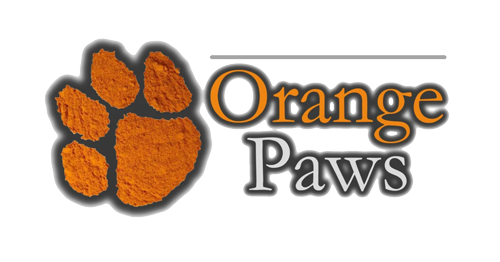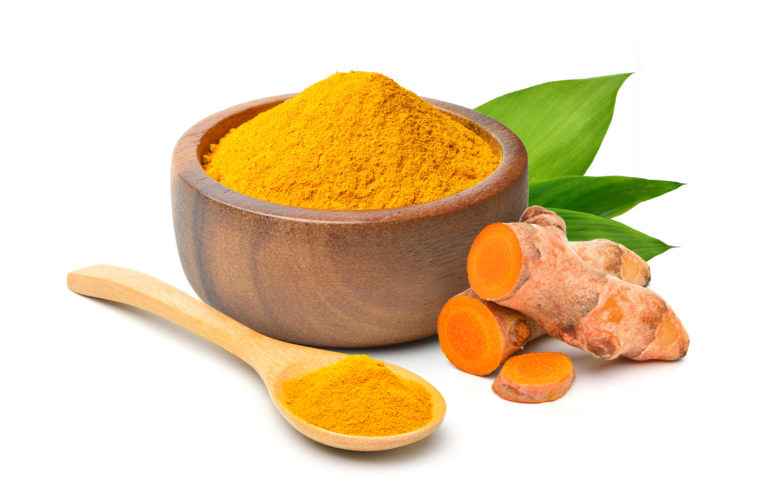


Orange Paws
Turmeric products for your dog, cat, and ranch animals. Our organic human-grade supplements can make a big difference in your pet’s life – especially if they are experencing mobility issues due to old age, arthritis, or dysplasia.
Why Turmeric For Dogs?
If you cook, you may already be familiar with turmeric, but for first timers, here’s a quick culinary lesson to get us started.
The turmeric herb, a member of the ginger family, is most commonly known for its deep orange color and is used for cooking, herbal medicine and dyes. Native to Middle Eastern and Southeast Asian countries, it has been a staple in cooking for thousands of years. Today it is a key ingredient in most curry dishes as well as yummy Thai, Indian, and Persian plates.
Ayurvedic and Chinese medicines have long known the benefits of turmeric for the body, inside and out.
“Ay….ur…vedic medicine?”
Quick explanation. An ancient Ayurvedic proverb reads: “When diet is wrong, medicine is of no use. When diet is correct, medicine is of no need.” Ayurvedic medicine is the traditional medicine of India, originating over 5000 years ago. How is this relevant today? Because it doesn’t just look at the aspect of treatment, it looks at prevention and using elements like nutrition, exercise and lifestyle factors to re-establish balance in the body. What we eat is a key component of this holistic healing approach.
We know that turmeric is a spice. It’s orange. We cook Eastern and Asian food with it. But why is it so good for our pets? The bio-active compound (active ingredient or healing properties) of turmeric is “curcumin” (not to be confused with a different spice called cumin). Curcumin is responsible for its bright orange color as well as a host of health benefits.
Western medicine is finally catching up with Eastern practice. Turmeric is now being researched extensively for pharmacological use in treating and/or reducing symptoms related to a wide range of health conditions. The National Institute of Health is conducting clinical trials on turmeric and curcumin.
Dr. Horwitz, the medical director of the Arizona Centre for Integrative Medicine and assistant professor of clinical medicine at the University of Arizona College of Medicine cites a 2006 University of Arizona study that found this potent anti-inflammatory to reduce the symptoms associated with rheumatoid arthritis. Clinical studies have shown that curcumin in turmeric is also a powerful antioxidant. Antioxidants neutralize rogue molecules that cause painful inflammation and damage joints affected by arthritis.
This is pretty significant for our senior K9 friends that may be suffering from the aches and pains associated with arthritis.
Another concern with our senior pets is heart health. As seen in us, our pets are susceptible to blood clots and high LDL-cholesterol. Turmeric has been found to lower LDL levels.
In addition, turmeric helps to reduce the risk of deadly clots that can lead to strokes and heart attacks.
What about the liver? Yes, turmeric is good for that too.
Our environment is becoming more and more toxic and that not only affects us, it impacts Fido as well. Our pets are susceptible to toxins in the environment and in their food, especially commercially produced kibble and treats.
Think of the liver as the main industrial center for the body. It’s involved in nearly every biochemical process required to manage health. The body’s ability to clot blood, to break down harmful toxins and other waste products, and to store energy are all controlled by the liver. It is a major player in your pet’s digestion, storing vitamins and producing bile which is necessary to break down fat. It’s a pretty important piece of machinery for your pet’s overall health.
Turmeric is liver-friendly, boosting the liver’s efficiency.
Turmeric has joined the fight against cancer! This powerful spice plays a significant role in preventive medicine. Worldwide, researchers find an effect on the spread of some cancers, the conversion of precancerous cells into cancer cells, and ability of cancer cells to establish their own blood supply. Certainly, turmeric is not the only thing you should do to prevent, control, and/or treat cancer; however, it certainly is exciting to know that the active ingredients in turmeric have anti-cancer properties.
Here’s a really important daily health benefit of turmeric: It is very gut-friendly!
- Reduces gas and bloating
- Helps to heal stomach ailments
- Aids in digestive disorders
SO HOW DO YOU FEED TURMERIC PLUS?
The suggested dosage is approximately 15 to 20 mg per pound of body weight in dogs in their dog food.
A simpler way of looking at it is an 1/8 to a 1/4 teaspoon per day, for every 10 lbs of dog weight ( 1/2 – 1 tsp for a 40 pound dog).
Make sure your pet has lots of water to ensure that they don’t get constipated.
Sprinkle it right on top of your pet’s food and mix.
Turmeric Plus is an organic product which is devoid of pesticides and herbicides thus assuring the potency of the product. For longevity, be sure to store it in a cool, dark place.
According to Dr. Demian Dressler, DVM known as the Dog Cancer Vet “[…] curcumin has some bioavailability problems.” This means that turmeric is poorly absorbed into the blood after it is taken by mouth. However, there are ways to eliminate this problem. Turmeric Plus contains an ingredient, organic black pepper, tested to improve bioavailability by approximately 2,000 fold.
If your dog turns his or her nose up at the smell or taste of Turmeric Plus, mix the powder in lowfat or regular yogurt. The bowl will be licked clean! The far in yogurt will help carry the turmeric (turmeric is fat soluable) right where right where it belongs.
Be careful and mix it in well with your pets’ food, or your pets might end up with turmeric mustaches! *If they do, feel free to post a picture with #OrangePaws
If your pet has a pre-existing condition, is currently on medication, has a planned surgery, or is pregnant , it is advisable to talk to your vet before taking or continuing any supplement.
Spice up the life of your companion animal with Orange Paws Turmeric Plus!
*Above information adapted from Dogs Naturally Magazine
Written by Planet Paws Blogger – Sarah MacKeigan
Sources & Information – Rodney Habib

FAQ
People living in a world with sophisticated medical approaches are living longer every decade. Yet, these extra years are now laden with chronic disorders, discomfort, and diseases—obesity, diabetes, dementia, heart disease, gut issues, osteoporosis, kidney disease, mood disorders, autoimmune diseases. A causal factor in all these issues is chronic inflammation, silently eroding health over decades, then surfacing in midlife and beyond. The problem is not confined to humans, but rampant in all mammals—including our beloved companion, the dog.
The search for anti-inflammatory potions, safe for long-term use, has led to the chemical evaluation of natural remedies. No other ancient medicinal has been researched as long or as thoroughly as turmeric. Scientists have shown, time and again, that a whole food sliced—-chopped or ground—- and consumed on a regular basis, is the safest and most effective approach for daily use.
For nearly 4000 years, turmeric has been an integral part of traditional Asian medicine. Today, scientific studies are underway evaluating this underground plant stem (called a rhizome), ground into a bright yellow powder. Their findings? The spice, Turmeric, is a potent source of anti-inflammatory proteins and other beneficial chemicals working against the causes of pain, gut discomfort, and disease. More than 300 compounds have been identified in turmeric, with attention presently on the healthful effects of the curcuminoids—concentrated in Turmeric Plus.
A spice is any pungent aromatic plant substance, used whole or ground.
Example:
tree bark (cinnamon)
fruit (peppercorns)
roots (turmeric)
seeds (nutmeg)
Herbs are plant leaves and stems, fresh or dried, that add flavor.
Example:
basil
thyme
oregano
cilantro
Vitamins and minerals are required for the basic daily functions of all cells. Beyond these life-supporting chemicals scientists have discovered thousands of additional elements in plant foods, called phytochemicals, that add protection against disease and pain. These phytochemicals are highly concentrated in herbs and spices. There are especially high levels of healthful phytochemicals in brightly colored herbs and spices, as in the orange-colored spice—turmeric.
Curcumin, the main ingredient in the curry spice turmeric, is a naturally occurring antioxidant with potent anti-inflammatory activity, as well as other protective properties.
In short, curcumin is a PHYTOCHEMICAL.
Beyond the proteins, carbohydrates, and fats provided by daily food intake, beyond the vitamins and minerals required for life (vita = life), turmeric is a concentrated source of unique healthful nutrients that support disease-free longevity in all species. This colorful spice has been the focus of extensive study in recent years to determine the chemical mechanism behind its potent anti-inflammatory activity.
Inflammation is a local, healing response by immune cells to tissue injury. The chemical process increases blood flow to the affected tissue and expands the size of local blood vessels to allow immune cells and a host of chemical mediators to remove toxic agents and damaged tissue.
Immune cells communicate by producing proteins—called cytokines. Cyto means cell and kine stands for protein. Like the words we use to communicate, cytokines are exchanged among the immune cells as signals for action (activating and sustaining inflammation) or signals to terminate the immune process (anti-inflammatory activity to block further inflammation).
The communication works similarly to the alphabet and words of language. Our letters form words that have meaning. Similarly, the amino acid composition of each cytokine has a specific meaning to immune cells.
Humans can hear or read words and grasp the meaning of the communication. A cytokine produced by one immune cell can fit into receptors on other immune cells transmitting information that directs the cell to activate or terminate inflammatory activity.
Inflammation can acts as both a “friend and foe”. It is an essential component of immediate defense against toxic proteins and microorganisms (bacteria, virus, fungus, etc.). However, a small (2 to 3-fold) increase in the concentration of inflammatory proteins (cytokines) correlates with the risk of chronic disease. This mild, but continual, inflammatory process may accelerate both the expression of genes related to disease and the progression of metabolic imbalances that later surface as diseases, i.e., heart disease, obesity, type 2 diabetes, dementia, gut issues, and others.
Lifestyle influences the activity of the immune system. Factors that increase inflammation include:
— pollution in air, water, and food enhance inflammation.
— excess body fat,
— lack of exercise,
— unhealthy foods.
Diet has a major effect immune system status and is a lifestyle variable that can work to protect one’s health or contribute significantly to disease.
Dogs consume food several times a day. The consumption of inflammatory vs. anti-inflammatory food impacts the balance of the immune system at every meal and snack. Beyond food, turmeric, a potent anti-inflammatory spice, supports immune balance every day. The goal is simple: For more healthy years, silence inflammation every day!
Turmeric directly silences the chronic, low-grade pro-inflammatory cytokines that are activated by today’s unhealthy lifestyle: poor quality air and water, lack of exercise, too much or too little sleep, eating too much saturated fat, too little fiber, too many simple carbohydrates.
The rhizome, turmeric, is native to India from the plant, Curcuma Longa. Turmeric is available for consumption as the fresh root or concentrated as a ground, dried powder.
Clinical trials on turmeric, in humans and animals, are underway, focusing on its potential role against:
direct inflammatory conditions, as in arthritis, bowel conditions, pain;
inflammatory-related diseases, as in cancer, cardiovascular disease, dementia, mood disorders, diabetes, skin diseases.
In a review of turmeric, released by the University of California in October 2016, turmeric has been found to be safe. However, it is always wise to inform your veterinarian before adding any supplement to the dog’s diet, especially if your companion animal is taking any medications.
Reference: University of California, Berkeley, Wellness Letter, Turmeric Comes on Strong; Volume 33, Issue 1, October 2016
Scientists have identified more than 300 compounds in turmeric. The healthful chemical group that has received the most attention is curcumin.
Daily intake of curcumin works for your dog’s body and brain: anti-inflammatory power, antioxidant activity, antibacterial effects, and anti-cancer protection. Because the brain is 60% fat, the fat-soluble turmeric powder permeates and protects against the destructive effects of inflammation in the brain. Other curcuminoids, relatives of curcumin, have many of these properties as well.
Scientists from the University of California state: “Get curcumin from food sources”: eat the cooked or raw turmeric root, use the ground turmeric root as a spice in food or placed in a capsule for convenient consumption on a daily basis.
Reference: University of California, Berkeley, Wellness Letter, Turmeric Comes on Strong; Volume 33, Issue 1, October 2016
The curcumin in turmeric is a fat-soluble chemical. Consuming the turmeric powder or root with fatty food improves the absorption of curcumin. Additionally, a pinch of black pepper greatly enhances both the bioavailability of curcumin and the conversion of curcumin to its active components by the liver.
Bioavailability is the amount of a substance (in this case the curcumin in turmeric) that is absorbed from the intestine into the circulation. The presence of food elements (such as black pepper and the various nutrients in the turmeric root) improve the absorption of the active compounds in the turmeric root.
The chemical, piperine, in black pepper aids bioavailability in two ways: (1) greatly improved absorption of the curcumin from the gut (2) enhanced conversion of the absorbed curcumin into chemical derivatives active in body and brain against pain and disease.
Long pepper, sometimes called Indian long pepper, has a taste similar to, but hotter than, that of its close relative Piper nigrum from which black, green and white pepper are obtained. All of these pepper varieties contain piperine. (Source: wikipedia.org)
Nourishment of brain and body cells by food, even concentrated sources of food such as spices and herbs, is best attained by daily intake.
- The fat in flax improves the absorption of turmeric from the gut.
- The purified curcumin maximizes the anti-inflammatory activity of turmeric without removing the main ingredient, turmeric, with its natural chemicals that are necessary for full potency of the product.
- The addition of black pepper provides the sole chemical, piperine, required for best utilization of the curcumin and the many other curcuminoids in turmeric.
The proportion of each of the ingredients in Turmeric Plus has been formulated to reflect the current research with canines.
References:
A combination cocktail improves spatial attention in a canine model of human aging and Alzheimer’s disease, Elizabeth Head, et. al., Journal of Alzheimer’s Disease 32 (2012), 1029-1042.
Natural Standard Herb and Supplement Guide: An evidence-based reference. Catherine E.Ulbricht, PharmD.
The Pet Lover’s Guide to Natural Healing for Cats and Dogs, B. Fougere, BVSc
The dosage of Turmeric Plus is based on the weight of the dog. References for ideal amounts of turmeric recommended for dogs:
A combination cocktail improves spatial attention in a canine model of human aging and Alzheimer’s disease, Elizabeth Head, et. al., Journal of Alzheimer’s Disease 32 (2012), 1029-1042.
Natural Standard Herb and Supplement Guide: An evidence-based reference. Catherine E.Ulbricht, PharmD.
The Pet Lover’s Guide to Natural Healing for Cats and Dogs, B. Fougere, BVSc
Over the decades, the subtle effects of mild, but chronic inflammation on the body and brain contributes to the onset of diabetes, heart disease, arthritis, gut issues, bone loss, and dementia.
Science has demonstrated many ways to combat inflammation and reduce the risk of pain and disease in people and their companions: healthy food, vitamin/mineral supplementation, proper rest, stress management, and exercise. Recently the power of concentrated foods - herbs & spices - have been added to the list of protective practices that can add more healthy years. Life offers no promises. Healthy living means adapting practices that keep your brain and body cells balanced and protected against the elements that trigger discomfort and disease.
At the present time, the focus is on turmeric:
It is an important spice protective against the subtle inflammation that may trigger disease-related genes any time in the life cycle of your dog.
If you are aware of the family history of your dog and there is chronic disease risk in the family, Turmeric Plus may extend healthy years.
It is a therapeutic remedy for pain and other ongoing inflammatory symptoms.
If your dog is experiencing pain or has an ongoing inflammatory problem, Turmeric Plus has been proven to decrease discomfort and symptoms.
Beyond a dog’s daily nutritional needs of protein, fat, carbohydrates, vitamins and minerals food, Turmeric Plus adds protection against the onslaught of subtle chemical factors that spark disease. Similar to the daily intake of food, Turmeric Plus is a lifetime approach to more healthy years.
Turmeric Plus has been formulated and tested for dogs and cats. Studies show that the same dosage applies to both, in effect, a safe maintenance-level dosage for dogs and cats is 1/4 teaspoon per 10 lbs. of animal's weight per day (ideally split between 2 feedings, 12 hours apart). Studies have also shown that turmeric is safe and effective on all mammals, which is why we launched our "Orange Equine" product for horses and other farm animals.
If your dog is under veterinary care for an acute problem, it may be recommended to terminate the supplement temporarily.
Examples:
Very high doses of turmeric can cause stomach upset and act as a blood thinner. Avoid turmeric/curcumin if your dog takes blood thinners such as warfarin (Coumadin), is about to have surgery, is pregnant or has gallbladder disease.
Always inform your veterinarian when giving your companion animal any supplement.
If your dog eats wet food, mix it with the food.
If your dog is fed dry food, you can sprinkle it on top of the food. If the dog does not consume all the product, spritz the dry food first with water, then add the turmeric powder.
There are two excellent way to enhance the overall anti-inflammatory activity of the supplement and improve acceptance:
A mixture of Turmeric Plus with plain low-fat or whole-fat yogurt.
The probiotic bacteria in the yogurt work throughout body and brain to diminish inflammation along with the Turmeric Plus. Most dogs love yogurt!
A mixture of the supplement in oil.
If your dog loves fish, mix the Turmeric Plus in a small amount of fish oil and add it to the wet or dry food. There are anti-inflammatory fats in fish oil, thus adding to healthy years. If your dog does not tolerate fish oil, olive oil is a good substitute. Oil from the olive is not anti-inflammatory, but adds needed stability to cells against inflammation.
The protective effects of the spice would not continue without replenishment. The active chemicals denature over time.
Puppies should begin supplementation as soon as possible. Inflammation has been noted in the human fetus due to the presence of inflammatory chemicals in the mother’s blood. Along with appropriate puppy food, Turmeric Plus helps to keep the fire of inflammation at bay for more healthy years. Consult your veterinarian for the proper time to begin supplementing your puppy.
Balance and moderation is the key to health. It is hard to find any nutritional factor that is safe long-term when given in huge excess. Great qualities of water devoid of any electrolyte balance from the diet can result in muscle cramping and other symptoms; too much vitamin C can increase the risk of kidney stones… you get the idea! The amount of turmeric recommended in Turmeric Plus is well below the amount that could cause side effects.
Yes. It is recommended to use Turmeric Plus within one year. The golden flax in Turmeric Plus is a fatty substance. Fat gets rancid, that is, it breaks down in the presence of oxygen over long periods of time.
Lorem ipsum dolor sit amet, consectetur adipisicing elit. Optio
The brain has limited capacity to deal with inflammation. Turmeric Plus is a natural aid to control inflammation in the brain.
References:
A combination cocktail improves spatial attention in a canine model of human aging and Alzheimer’s disease, Elizabeth Head, et. al., Journal of Alzheimer’s Disease 32 (2012)
1029-1042.
The effect of curcumin (turmeric) on Alzheimer's disease: An overview.
Shrikant Mishra and Kalpana Palanivelu, Ann Indian Acad Neurol. 2008 Jan-Mar; 11(1): 13–19. doi: 10.4103/0972-2327.40220
WebMD Health News: "Curry Spice May Counter Alzheimer's."
, neque qui velit. Magni dolorum quidem ipsam eligendi, totam, facilis laudantium cum accusamus ullam voluptatibus commodi numquam, error, est. Ea, consequatur.
Inflammation increases the mutation of cancer-related genes. The anti-inflammatory effects of Turmeric Plus may be protective against cancers, especially colon cancer, as the supplement reacts directly with cells in the gut.
A number of laboratory studies on cancer cells have shown that curcumin does have anticancer effects. It seems to be able to kill cancer cells and prevent more from growing. It has the best effects on bowel cancer, breast cancer, stomach cancer and skin cancer cells.
Reference: Can turmeric prevent or treat cancer? | Cancer Research UK, Aug 6, 2015.
Researchers in France fed 20 mice a diet supplemented with curcumin or a comparison diet not supplemented. After 16 weeks, mice fed on the curcumin-based diet had a 26% reduction in fatty deposits in their arteries compared to mice on the comparison diet. The herb appears to alter the genetic signaling involved in plaque buildup in blood vessel walls.
Reference: Presented at the American Heart Association's Basic Cardiovascular Sciences Annual Conference in Las Vegas, July 20-23, 2009. www.webmd.com/heart-disease/news/20090720/curcumin-may-prevent-clogged-arteries
Research
Head, E., et. al. A combination Cocktail Improves Spacial Attention in a Canine Model of Human Aging and Alzheimer’s Disease. Journal of Alzheimer’s Disease. 32:2012, 1029-1042 https://www.ncbi.nlm.nih.gov/pmc/articles/PMC4006672/
McGeer, E. G., McGeer, P.L. Neuroinflammation in Alzheimer’s Disease and Mild Cognitive Impairment: A field in its infancy. Journal of Alzheimer’s Disease. 19:2010, 355-361. https://www.deepdyve.com/lp/ios-press/neuroinflammation-in-alzheimer-s-disease-and-mild-cognitive-impairment-KdCF1c4z2m
Colman, C. W., Head, E. The Canine (dog) Model of Human Aging and Disease: Dietary, environmental and immunotherapy approaches. 15:2008, 685-707. https://www.researchgate.net/publication/23677126_The_Canine_Dog_Model_of_Human_Aging_and_Disease_Dietary_Environmental_and_Immunotherapy_Approaches
Head, E., et. al. Effects of Age, Dietary, and Behavioral Enrichment on Brain Mitochondria in a Canine Model of Human Aging. Experimental Neurology. 220:2009, 171-176. https://www.ncbi.nlm.nih.gov/pmc/articles/PMC2761532/
Lim, G. P., et. al. The Curry Spice Curcumin reduces Oxidative Damage and Amyloid Pathology in an Alzheimer Transgenic Mouse. Journal of Neuroscience. 21:2001, 8370-8377. http://www.jneurosci.org/content/21/21/8370
Tei, M. et. al. The Binding of Curcumin to Various Types of Canine Amyloid Proteins. Journal of Veterinary Medical Science. 74:2012, 481-483. https://www.jstage.jst.go.jp/article/jvms/74/4/74_11-0420/_article
Garcia-Alloza, M., et. al. Curcumin Labels Amyloid Pathology in Vivo Disrupts Existing Plaques and Cerebral Amyloid Angiopathy in the Aged Brain of Various Animals and to Neurofibrillary Tangles in Alzheimer’s Brain. Journal of Veterinary Medical Science. 74:2007, 1095-1104. https://onlinelibrary.wiley.com/doi/full/10.1111/j.1471-4159.2007.04613.x
Yang, F., et. al. Curcumin Inhibits Formation of Amyloid Beta Oligomers and Fibrils, Binds Plaques, and Reduces Amyloid in Vivo. Journal of Biological Chemistry. 280:2005, 5892-5901. http://www.jbc.org/content/280/7/5892.full
Zhang, C., et. al. Curcumin Decreases Amyloid-beta Peptide Levels by Attenuating the Maturation of Amyloid-beta Precursor Protein. Journal of Biological Chemistry. 285:2010, 28472-28480. https://www.researchgate.net/publication/45151063_Curcumin_Decreases_Amyloid-_Peptide_Levels_by_Attenuating_the_Maturation_of_Amyloid-_Precursor_Protein
Shoba, G., et. al. Influence of Piperine on the Pharmacokinetics of Curcumin in Animals and Human Volunteers. Planta Medica. 64:1998, 353-356. https://www.ncbi.nlm.nih.gov/pubmed/9619120
Vijayakumar, R. S., et. al. Antioxidant Efficacy of Black Pepper (Piper Nigrum L.) and Piperine in Rats with High Fat Diet Induced Oxidative Stress.Redox Report. 9:2004, 105-110. https://www.tandfonline.com/doi/abs/10.1179/135100004225004742
Chonpathompikunlert, P., et. al. Piperine, the Main Alkaloid of Thai Black Pepper, Protects Against Neurodegeneration and Cognitive Impairment in Animal Model of Cognitive Deficit like Condition of Alzheimer’s Disease. Food and Chemical Toxicology. 48:2010, 798-802. http://www.academia.edu/3739436/Piperine_the_main_alkaloid_of_Thai_black_pepper_protects_against_neurodegeneration_and_cognitive_impairment_in_animal_model_of_cognitive_deficit_like_condition_of_Alzheimer_s_disease
Taisuke Ono, et. al. Curcumin Ameliorates Skeletal Muscle Atrophy in Type One Diabetic Mice by Inhibiting Protein Ubiquitination. Experimental Physiology. 100.9:2015, 1052-1063. https://physoc.onlinelibrary.wiley.com/doi/full/10.1113/EP085049
Chiu, J., et. al. Curcumin Prevents Diabetes-associated Abnormalities in Kidneys by Inhibiting p300 and Nuclear Factor-kB. Nutrition. 25:2009, 964-972. https://www.sciencedirect.com/science/article/pii/S0899900709000069
Epstein, J., et. al. Curcumin as a Therapeutic Agent: The evidence from in vitro animal and human studies. British Journal of Medicine.i 103:2010, 1545-1557. https://www.researchgate.net/publication/41138694_Curcumin_as_a_therapeutic_agent_The_evidence_from_in_vitro_animal_and_human_studies
Jobin, C., et. al. Curcumin Blocks Cytokine-mediated NF-kB Activation and Pro-inflammatory Gene Expression by Inhibiting Inhibitory Factor I-kB Kinase Activity. Journal of Immunology. 163:1999, 3474-3483. http://www.jimmunol.org/content/163/6/3474
Clutterbuck, A. L., et. al. Interleukin-1B Induced Extracellular Matrix Degradation and Glycosaminoglycan Release is Inhibited by Curcumin in an Explant Model of Cartilage Inflammation. Annals of the New York Academy of Sciences. 1171:2009, 428-435. https://www.researchgate.net/publication/26782551_Interleukin-1b-Induced_Extracellular_Matrix_Degradation_and_Glycosaminoglycan_Release_Is_Inhibited_by_Curcumin_in_an_Explant_Model_of_Cartilage_Infla
Our Partners
Orange Paws is proud to have the following businesses carry our main products:






About Us
Orange Paws was created by Laura Pawlak, PhD (“Smart Dog”) and Jacob Carter (“Top Dog”).
Laura L Pawlak, PhD
EDUCATION:
Mundelein College, Chicago, Illinois, B.S.
University of Illinois, Urbana, Illinois, M.S. Nutrition
Hines V. A. Hospital, Maywood, Illinois, Dietetic Internship
University of Illinois, Medical Center, Chicago, Illinois
Ph.D., Biochemistry, specialty Immunology and Genetics
University of California, San Francisco Medical Center,
Postdoctorate, Immunology
Teaching Credentials, California, College level
Certification – Aerobic Instructor, CPR Trained, AFAA Assoc.
Certification – Fitness Instructor, A.C.S. M.
PROFESSIONAL ASSOCIATIONS:
American Dietetic Association
Aerobics and Fitness Association of America
Am. Dietetic Association Practice Group
Sports & Cardiovascular Nutritionists
American College of Sports Medicine
HONORS:
Honor Society, Mundelein College, Chicago, Illinois
Magna Cum Laude Graduate, Mundelein College, Chicago, Illinois
Full Fellowship, University of Illinois, Urbana, Illinois
Full Fellowship, University of Illinois, Chicago, Illinois
Postdoctoral Fellowship, U. California, San Francisco
Award, Best Performance, Dietetic Internship, Hines VA Hospital
Award, Best Graduate Lecturer, University of Illinois, Chicago
CURRENT POSITION: INTERNATIONAL SPEAKER, 72-80 seminars/year
Institute for Natural Resources/Biomed Corporations, Concord, CA 1991 to present
Jacob Carter
EDUCATION:
University of Nevada – Las Vegas
University of Phoenix
HeartMath Institute
CHARITABLE & COMMUNITY AFFILIATIONS:
AFLAC Children’s Cancer Center of Atlanta, GA / CHOA – Former Arizona Ambassador
Patagonia Area Business Association – Former Board Member
Beads of Courage, Inc. – Former Director of Community Outreach
TreeHouse Farm – Former Executive Director
Grey Paws – Current Executive Director
HONORS:
2009 AFLAC Cancer Center / CHOA Facebook Campaign: Raised $1.16M and 851,215 Members. Creator and Primary Administrator of Cause
